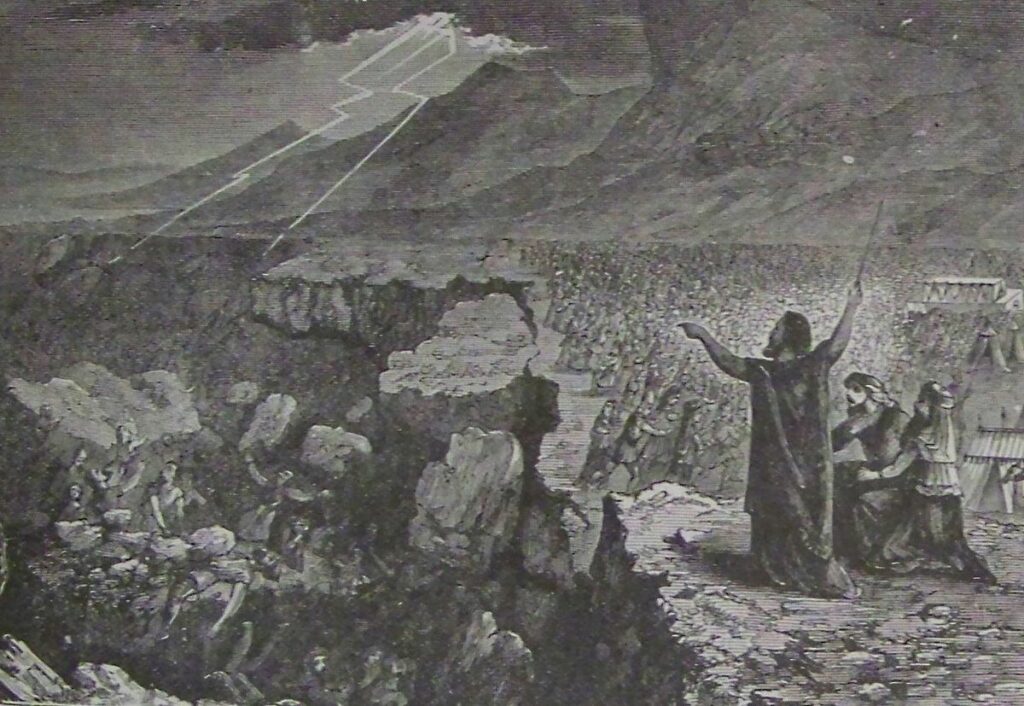
Our story so far is riddled with judgment; it seems like fodder for the old allegation that the God of the Old Testament is a God of impatience, fury, judgment, and violence.
But there’s a reason that allegation has been long and thoroughly discredited.
Even in the telling of this story, there is grace.
To begin with, the fact that there can even be a rebellion is evidence of grace. God has pronounced judgment on this generation of Israelites because of their unbelief at Kadesh-barnea, but he hasn’t withdrawn from them either his presence or the promises he has made. They are still a nation, with laws and order and stable leadership. If they had gotten what they deserved, there would have been nothing to rebel against.
And that leadership, who have been directly attacked, do not lash out against the threat; they leave the decision to God (Nu 16.5)—even though they’re furious (Nu 16.15). Even the Lord, to whom belongs judgment, doesn’t lash out; his glory appears, giving all who see time to avert the judgment (Nu 16.19). And with judgment impending, Moses—of all people—intercedes for the lives of those in peril (Nu 16.22), and then tells everyone the way of escape (Nu 16.26).
After the outbreak of judgment against the rebels, God orders memorial in the altar plates, so that the people will be reminded of the danger that lurks down the road of rebellion (Nu 16.38).
And when the rebellion continues in spite of everything, Moses and Aaron intercede to stop the plague that is now raging.
Grace at every turn.
But still there’s more.
There’s a little line later in the book, one that seems like a throwaway—
“Notwithstanding the children of Korah died not” (Nu 26.11).
God allowed Korah’s line to continue.
And 500 years later, we hear from them again.
When Solomon instituted the Temple ceremonies, he retained the Levite orders; the descendants of Korah who had not died served in the temple. And what a service they had.
(I should say here that some scholars believe that these Temple workers were descended from a different Levite named Korah, based on 1Ch 9.19. I’m inclined to disagree, because 1) 1Ch 9.19 doesn’t require that this be a different Korah—in fact, “both” Korahs have a son named Ebiasaph [1Ch 6.37-38]); 2) The rebel Korah’s people were in fact Levites engaged to serve in the Tabernacle complex; and 3) There seems to be no reason for the Spirit to inspire the “throwaway line” about Korah’s children not dying if they’re just going to disappear from history at that point.)
The Korahites served as porters, bakers, and musicians—and the musicians wrote eleven of the Psalms: 42-49, 84-85, and 87-88.
And if you’ll look through these Psalms, you’ll find that they contain some of the most lyrical lines in the whole hymnbook—
Psalm 42:
1 As the hart panteth after the water brooks, so panteth my soul after thee, O God. 2 My soul thirsteth for God, for the living God: when shall I come and appear before God? … 11 Why art thou cast down, O my soul? and why art thou disquieted within me? hope thou in God: for I shall yet praise him, who is the health of my countenance, and my God.
Psalm 45:
6 Thy throne, O God, is for ever and ever: the sceptre of thy kingdom is a right sceptre. 7 Thou lovest righteousness, and hatest wickedness: therefore God, thy God, hath anointed thee with the oil of gladness above thy fellows. 8 All thy garments smell of myrrh, and aloes, and cassia, out of the ivory palaces, whereby they have made thee glad.
Psalm 46:
1 God is our refuge and strength, a very present help in trouble. 2 Therefore will not we fear, though the earth be removed, and though the mountains be carried into the midst of the sea; 3 Though the waters thereof roar and be troubled, though the mountains shake with the swelling thereof. 4 There is a river, the streams whereof shall make glad the city of God, the holy place of the tabernacles of the most High. 5 God is in the midst of her; she shall not be moved: God shall help her, and that right early.
Psalm 48:
1 Great is the LORD, and greatly to be praised in the city of our God, in the mountain of his holiness. 2 Beautiful for situation, the joy of the whole earth, is mount Zion, on the sides of the north, the city of the great King.
Psalm 84:
1 How amiable are thy tabernacles, O LORD of hosts! 2 My soul longeth, yea, even fainteth for the courts of the LORD: my heart and my flesh crieth out for the living God. 3 Yea, the sparrow hath found an house, and the swallow a nest for herself, where she may lay her young, even thine altars, O LORD of hosts, my King, and my God.
Psalm 85:
10 Mercy and truth are met together; righteousness and peace have kissed each other.
Psalm 87:
3 Glorious things are spoken of thee, O city of God.
The rebels learned. And a gracious God restored to them a heritage.
We’re all rebels. But rebels can repent, and repentant rebels can thrive.
Photo credit: publishers of the 1890 Holman Bible, Public domain, via Wikimedia Commons
